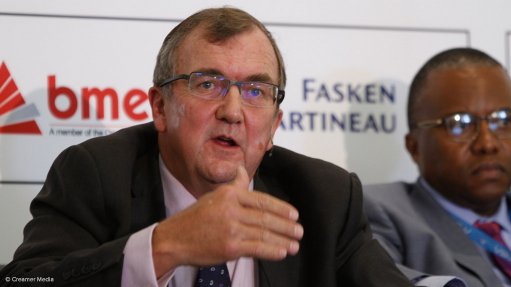
Randgold Resources CEO Mark Bristow
Photo by: Duane Daws
JOHANNESBURG (miningweekly.com) – Randgold Resources’ Democratic Republic of Congo- (DRC-) based Kibali gold mine remains on track to achieve its production target of 610 000 oz this year as its underground operations and the integration and automation of the vertical shaft enters the final commissioning and automation stage, CEO Mark Bristow said in a statement on Monday.
The LSE- and Nasdaq-listed company is anticipating a significant increase in Kibali’s production once the final shaft commissioning, which remains on a tight schedule, has been completed.
Following the anticipated completion of the underground mine in the fourth quarter, the only major capital project still in the works would be Kibali’s third new hydropower station, which is currently being built by an all-Congolese contracting team.
“The availability of self-generated hydropower and the mine’s high degree of mechanisation and automation are important factors in Kibali’s ability to sustain its profitability throughout the ups and downs of the gold price cycle,” he said.
To date, over $2-billion has been spent on acquiring and developing Kibali, of which the majority had been paid out in the form of taxes, permits, infrastructure and payments to local contractors and suppliers.
“With capital expenditure tapering off, Kibali should now be preparing to pay back the loans taken to fund its development. We are concerned, however, that its ability to do so will be impeded by the increasing amount of debt – currently standing at over $200-million owed to the mine by the DRC government,” Bristow said.
He pointed out that another troubling development was the recent reintroduction to Parliament, by the Ministry of Mines, of a proposed new mining code, which is the same as the one the government withdrew in 2015 after it was comprehensively demonstrated that it would seriously damage or even destroy the Congolese mining industry.
“Despite all the challenges, including the volatile political climate and a deteriorating economy, we continue to invest here. Our exploration teams are searching for our next big discovery in the greenstone belt of the north-eastern DRC,” Bristow said.
He added that the DRC had all the materials for building a sustainable mining industry, but said that would require a fully committed partnership between the government and mining companies.
“We remain confident that such a partnership is within reach, and that the government will see the critical importance of maintaining a stable, investor-friendly fiscal and regulatory environment for the country’s mining sector,” Bristow stated.